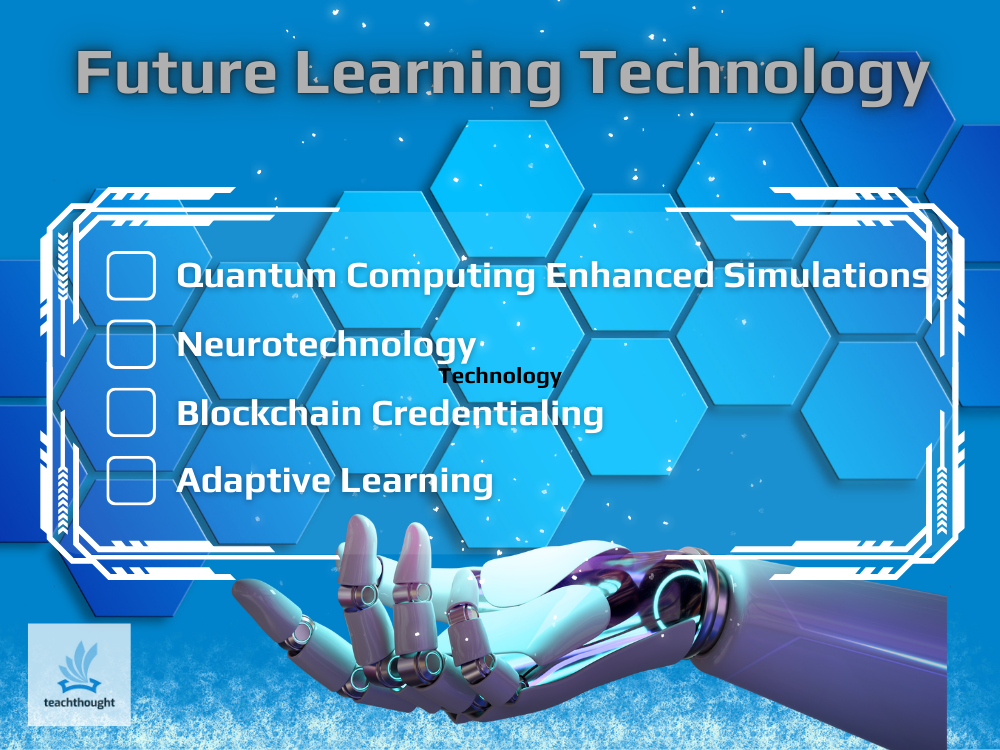by TeachThought Employees
In ‘Shifts For The Classroom of the Future,’ Terrell Heick stated, “It’s difficult sufficient to handle a conventional studying atmosphere the place the curriculum is handed to you, and conferences are set, and also you’re merely there to handle; including extra components to the combo looks like asking for hassle.
However the reality is, it’s turning into more and more tough to teach kids within the face of such radical technological and pedagogical development.”
In comparison with the instruments we’ve at the moment, superior studying know-how is past the consideration and attain of most working towards lecturers.
And we’re no less than a decade away from most of those if no more.


Definitely, there’ll extra future studying applied sciences–many we are able to’t see and even start to suspect. It might even be the case that none of those applied sciences are ever realized.
As all the time, something that tries to foretell know-how 25 years from now’s extremely speculative and sure inaccurate.
Nevertheless, it might be helpful to attempt to think about.
See additionally How To Train Synthetic Intelligence With out Expertise
1. Synthetic Intelligence Tutors
Synthetic Intelligence (AI) tutors will present personalised studying experiences for every scholar, adapting to their studying kinds and want in real-time. These AI techniques will supply on the spot suggestions, determine areas the place college students battle, and tailor classes accordingly.
How And What It May Change
AI tutors might remodel your classroom by guaranteeing every scholar receives individualized consideration and assist, making schooling more practical and accessible.
2. Quantum Computing Enhanced Simulations
Quantum computing will allow extremely superior simulations and modeling that may deal with advanced; multidimensional knowledge units far past the potential of present computer systems. In schooling, college students can interact in intricate physics, chemistry, and biology simulations, experimenting and studying in a risk-free, digital atmosphere.
How And What It May Change
Quantum computing-enhanced simulations might revolutionize your educating by providing deeper insights into scientific phenomena and enhancing problem-solving expertise by high-fidelity simulations.
3. Neurotechnology Studying Interfaces
Neurotechnology, together with brain-computer interfaces, will facilitate direct interplay between college students’ brains and academic content material. These interfaces will allow college students to regulate units and entry data utilizing their ideas, creating new methods to be taught and work together with know-how.
How And What It May Change
Within the far, far future, neurotechnology studying interfaces might change your classroom dynamics by permitting college students with bodily disabilities to take part extra totally and by offering all college students with extra environment friendly and intuitive methods to have interaction with academic materials.
4. Blockchain Credentialing
Blockchain know-how will securely retailer and confirm academic credentials and achievements. This can present a clear and tamper-proof approach of monitoring college students’ progress and certifications, making it simpler for college kids to share their accomplishments with potential employers and establishments.
How And What It May Change
Blockchain credentialing might streamline the method of credential verification, lowering fraud and guaranteeing that your college students’ achievements are precisely acknowledged.
5. Biometric Suggestions Programs
Biometric suggestions techniques will monitor college students’ bodily and emotional states, offering real-time knowledge that will help you perceive their engagement and well-being. This know-how can detect indicators of stress, fatigue, or distraction, permitting for well timed interventions to enhance studying situations.
How And What It May Change
Biometric suggestions techniques might create a extra responsive academic atmosphere the place your educating methods are tailored primarily based on college students’ vary of fast wants.
6. Adaptive Studying Platforms
Adaptive studying platforms will use knowledge analytics and machine studying to create personalized studying pathways for every scholar. These platforms will regulate the issue and kind of content material primarily based on college students’ efficiency and preferences, guaranteeing they’re always challenged however not overwhelmed.
How And What It May Change
Adaptive studying platforms might make your educating extra environment friendly by optimizing the tempo and elegance of instruction to go well with particular person learners, main to raised academic outcomes.